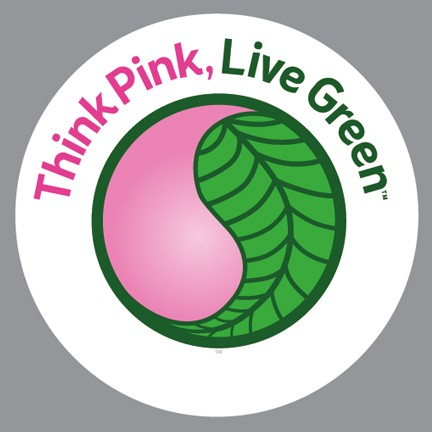Last week, I had the great opportunity to hear a talk given by Dr. Marisa Weiss, a breast cancer oncologist and president and founder of Breastcancer.org, the #1 online breast health and breast cancer resource.
In addition to being a breast cancer oncologist and philanthropist, last year, she herself was diagnosed with breast cancer. WTF, right? Well, the Silver Lining is that not only is she healthy now, but she is able to care for her patients with both professional as well as a personal experience, which gives her tremendous perspective.
I was introduced to Marisa shortly after my FBC (F-bomb breast cancer) diagnosis. She has been my mentor, clinician, and my ultimate Silver Lining.
At the Chicago luncheon, she shared information with us from the new Think Pink, Live Green initiative started by Breastcancer.org.
This initiative offers practical steps that we all can take to decrease the risk of FBC…in my case, the risk of it (ahem) returning.
What I loved about Marisa’s talk is that she presented accessible and actionable information to decrease the risk of getting FBC. There is so much mumbo-jumbo available that doesn’t make sense and/or is overwhelming. Not so now.
I feel as if I’ve been given insider’s tips on cancer prevention…it’s so great! And the Silver Lining is that it’s not insider information at all. The Think Pink, Live Green steps are available free of charge online (just click on the green).
There are 31 super great recommendations in the Think Pink, Live Green initiative. Some of my personal favorite recommendations are below:
- Avoid taking extra hormones.
- Get to a healthy weight and stick to it. Young girls who stay at a healthy weight and keep physically active are less likely to have early puberty and more likely to maintain these healthy habits as adults.
- Get regular exercise (5 to 7 hours per week is best).
- Limit alcohol use (5 or fewer drinks per week).
- Get fresh air.
- Avoid unnecessary radiation. Radiation exposure should especially be avoided or limited in teenage girls and young women during the process of breast development. If a diagnostic procedure is ordered, ask if a non-radiation kind of test, such as an ultrasound, can be done instead or as a first step.
- Vary your diet and lifestyle. Adding variety and mixing it up can keep you from getting bored and help you sustain healthy habits.
- Avoid empty calories. Sorry, no more Ding-Dongs!
- Eat small meals. Consuming small amounts of food throughout the day limits overstimulation of breast cells and provides other healthy benefits. It’s also the best way to meet your body’s steady energy requirement and help with weight management.
- Believe in yourself. Lead by example.
Not only does Marisa treat patients in the trenches of breast cancer, but she is building a movement toward prevention. I can’t think of a better Silver Lining!
Be the change you wish to see in the world.
– Gandhi




This is great! I'm a true believer in prevention. I would prefer to see more runs, walks and general fundraising for prevention awareness, rather than a so called cure. Think about it… every year we hear of yet another so called cure for cancer that has been successful in rats – only to fail in human trials. I'm convinced that healthy lifestyle for the mind, body and spirit is our very best medicine.